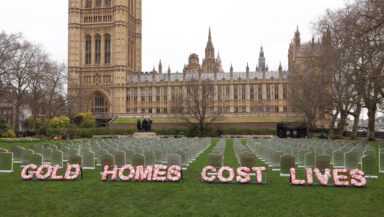The court of appeal has ruled that the government’s plans for a third runway at Heathrow failed to consider the UK’s commitments to reduce carbon emissions under the Paris agreement. It’s the latest twist in a saga that has been rumbling on for well over 10 years. Every step of the way, Greenpeace and many other groups – including HACAN, Stop Heathrow Expansion, local authorities, local communities and London’s mayors – have sought to block a new runway.
So what does this new ruling mean for the third runway and the climate crisis?
What’s happened?
In 2018, the government released the Airports National Policy Statement which explicitly backed a third runway at Heathrow airport. This was despite previous commitments from David Cameron when he was prime minister that there would be no third runway.
Campaign groups opposed to airport expansion – including Greenpeace – responded with a series of judicial reviews, no less than five of them. These challenged the decision on various grounds, such as air pollution, noise pollution and traffic increases.
These cases were initially dismissed by the high court. But today’s ruling comes from the court of appeal, which found that the government didn’t take into account its commitments under the global Paris agreement to reduce emissions. Paris of course being the agreement, currently between every country on earth, to dramatically reduce carbon emissions in order to keep global temperature increases below 1.5ºC.
This decision is monumental. The court has ruled that climate change has to be factored into the government’s national aviation policy, overturning claims from ex-transport minister Chris Grayling that the Paris agreement could effectively be ignored.
Above all, it shows that the government’s commitments under the Paris agreement have to be taken into account in national law.
What happens next?
The government has said it won’t appeal the ruling, which is an acknowledgement of the significance of its national and international climate obligations. But it could take other steps.
It could rewrite the national aviation policy to attempt to take into account the Paris agreement and Boris Johnson’s own commitment to bringing the UK’s net emissions down to zero. But this would require substantial policy changes which, if the government insists on trying to expand Heathrow airport, may result in further legal and political challenges.
The government would still be faced with the challenge of wanting to expand airports, while at the same time needing to bring down carbon emissions. And let’s not forget Boris Johnson’s promise to personally lie down in front of the bulldozers if a third runway at Heathrow went ahead.
It’s worth noting that the government’s main argument for building the new runway – that it’s necessary for UK business to flourish – is flimsy. The bulk of journeys made to and from Heathrow are made by people travelling for pleasure rather than work. And the government’s own figures show that the majority of flights are taken by just 10% of the population. Nearly half of UK people don’t take a single flight in any one year.
Does this mean Heathrow’s third runway will be abandoned?
Not yet, although the court’s decision is a major spanner in the works. The government will face serious hurdles if it still wants to push it through.
For the third runway to go ahead, the government could attempt to try one of two options. One is that the government could try to get round the court ruling by trying to justify how the expansion accounts for climate change. For instance, by saying it expects new technologies will come along that will be able to deal with the extra emissions.
Relying on something that doesn’t yet exist is extremely risky. Much-vaunted technologies such as carbon capture and storage (to remove carbon from the atmosphere and lock it away somewhere) haven’t yet been proven to work at the large scales needed. Meanwhile, increased plane efficiency will have a limited impact on emissions, and using biofuels risks prioritising crops grown for fuel over crops grown for food because they’re more profitable.
The other option could be to allow the third runway to go ahead but not allow expansion at any other airports around the country. However, this approach would also be fraught with problems.
First, there’s a lack of evidence that the aviation industry is able to truly decarbonise, so the climate emergency requires no new runways anywhere in the UK. Second, prioritising Heathrow over other regional airports would fly in the face of Johnson’s promises since the 2019 general election that regions outside London and the south east would receive more investment and better transport connections.
Of course, if the government were treating the climate crisis with the seriousness it deserves, it would abandon airport expansion completely. Instead, it should direct its time and effort towards expanding and electrifying public transport across the UK. It should also make frequent flyers pay more for their flights to reduce demand.
Later this year, the UK will host COP26, the global climate conference in which governments will hopefully commit to further action to put the brakes on the climate crisis. Cancelling all plans for airport expansion, including the third runway, as part of the UK’s efforts to reach net zero emissions is vital. It would also be the perfect way to set a great example for the rest of the world.



